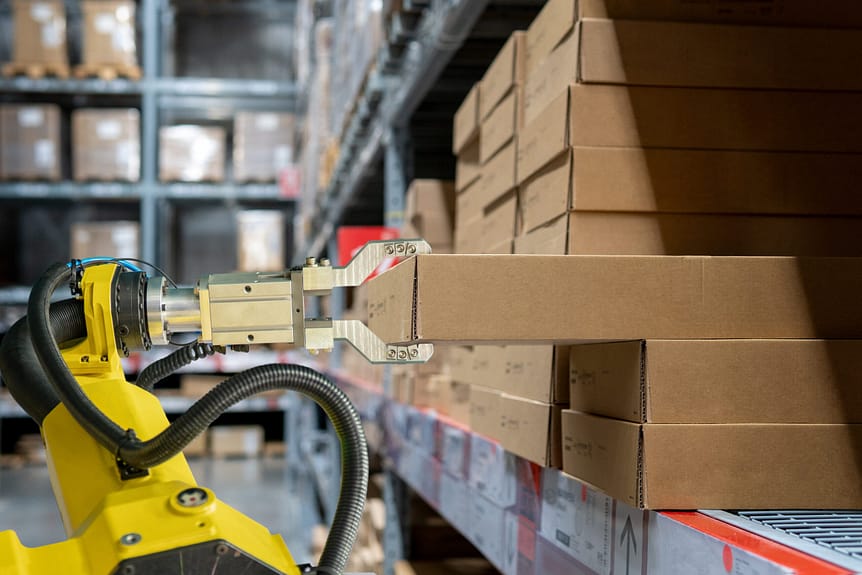In the relentless hustle of the e-commerce world, staying ahead means keeping up with trends and creating and capitalizing on new opportunities. Today’s most ground-breaking innovations lie in state-of-the-art warehouses and the algorithms and automated systems that drive them. Artificial intelligence (AI) has evolved from a buzzword to a strategic necessity for businesses aiming to optimize their fulfillment processes. But how can you harness this extremely versatile technology to solve non-traditional problems in fulfillment? Here’s what e-commerce entrepreneurs and supply chain managers need to know.
Understanding AI’s Role in Non-traditional Problem Solving
AI isn’t just about automating repetitive tasks; it’s also about finding intelligent, data-driven solutions to complex challenges in your fulfillment network. From reducing return rates by analyzing product data to predicting inventory needs with startling accuracy, AI systems offer many benefits that traditional problem-solving methods can’t replicate.
For example, AI technology can help mitigate the impact of unpredictable events, like weather-related delays or sudden spikes in demand, by utilizing advanced data models to pre-emptively optimize inventory levels and distribution routes. AI’s ability to interpret and predict human behavior also has implications for personalization and customer service, where understanding and acting upon individual customer needs can significantly improve overall satisfaction.
AI-Enhanced Picking and Packing
One area within fulfillment where AI excels is picking and packing, which traditionally required substantial human labor and was a significant cost center for e-commerce businesses. By introducing AI-powered robotic picking systems, companies have seen marked improvements in speed and efficiency, reducing fulfillment times and improving customer satisfaction.
Take ‘pick-to-light’ technology, for instance—a system that uses lights and displays to direct workers to the correct items and quantities for an order. When integrated with AI, this technology can optimize the picking route in real-time, reducing time and motion inefficiencies. Additionally, AI can learn from historical data to forecast order trends and pre-position frequently ordered items, further streamlining the process.
AI’s Impact on Inventory Management
Accurate inventory management is crucial in reducing operational costs and improving customer experience. Inventory saved in the ‘right’ or most accessible location ensures a quick and efficient fulfillment process. AI makes predictive analytics far more accurate and responsive to real-time demand, reducing the likelihood of stockouts or overstock situations.
AI algorithms can also monitor product life cycles and seasonal trends, informing the optimal time for promotions or clearance activities to avoid obsolescence. Furthermore, by analyzing consumer buying behavior, AI can make recommendations for purchasing patterns, which help to keep inventory levels in sync with consumer demand.
The Power of AI in Last-Mile Delivery
The last mile of delivery often presents the highest cost and the most potential for error. AI assists in optimizing delivery routes to minimize fuel consumption and delivery times. Advanced route optimization algorithms consider factors beyond geographical proximity, such as traffic patterns, weather, and the number of stops.
In addition to route optimization, AI can enhance the customer delivery experience. Predictive analytics can provide tighter delivery windows, and machine learning can lead to more accurate ETAs. This precision is a competitive advantage for e-commerce companies, particularly in high-value or time-sensitive deliveries.
AI for Return Management and Customer Service
Dealing with product returns is a complex and labor-intensive process for e-commerce businesses. AI technologies can simplify this by automating the assessment of returned items, expediting the return process, and identifying trends that lead to returns, such as defective products or inaccurate descriptions.
AI chatbots are also revolutionizing customer service by providing instantaneous and cost-effective support. Advanced natural language processing capabilities enable AI chatbots to understand and respond to customer queries coherently, escalating complex problems to human agents only when necessary. AI chatbots enhance the customer experience and improve the efficiency of customer service operations.
AI in Action at MSI Automate
MSI Automate, a leader in automating and digitizing fulfillment operations, proves AI technology can transform fulfillment achievements. By implementing AI capabilities, we have helped companies experience significant improvements in not only efficiency but also in reducing the costs associated with errors and returns. Our case studies provide tangible evidence of how AI can solve non-traditional problems and deliver results directly contributing to the bottom line.
AI Implementation in Your Fulfillment Operations
While the benefits of AI in fulfillment are clear, implementing AI technology requires a strategic approach. Begin by identifying the areas of your fulfillment process that could benefit the most from AI enhancement. AI enhancement may involve working with data scientists and logistics experts to develop and deploy these AI solutions.
Pilot programs and phased implementations can also offer a low-risk way to test the effectiveness of AI systems in your specific environment. By starting small and gradually increasing, you can ensure that the AI technology is appropriately integrated and delivers the expected benefits.
Collaborating with AI solution providers, like MSI Automate, can also accelerate the process, as they bring extensive experience and knowledge. By partnering with experts, you can leverage their AI technologies and industry insights to develop custom solutions that align with your business goals and operational needs.
The Future Landscape of AI in Fulfillment
The potential applications of AI in e-commerce fulfillment are limitless. From intelligent supply chain networks that automatically respond to changes in demand to robotic systems that can learn and adapt to handle new products, the future of AI in fulfillment is an exciting frontier for innovation.
Today, E-commerce companies investing in AI technology will likely see a significant competitive advantage tomorrow. By adopting a forward-thinking approach and staying abreast of the latest developments in AI, companies can revolutionize their fulfillment processes and enhance their ability to meet the needs of the modern consumer.
AI in non-traditional problem-solving within fulfillment operations is no longer considered a luxury and is increasingly becoming necessary. By leveraging the power of AI, e-commerce entrepreneurs and supply chain managers can transform their operations, improve efficiencies, reduce costs, and ultimately deliver a superior customer experience. The time to invest in AI for fulfillment is now.

